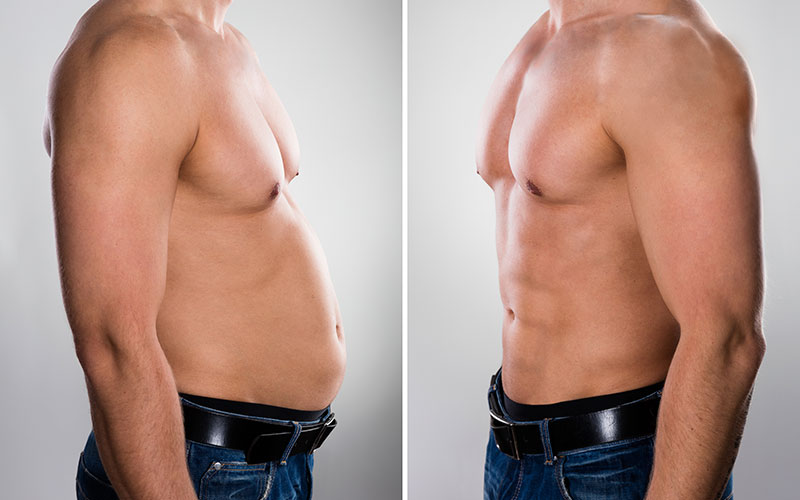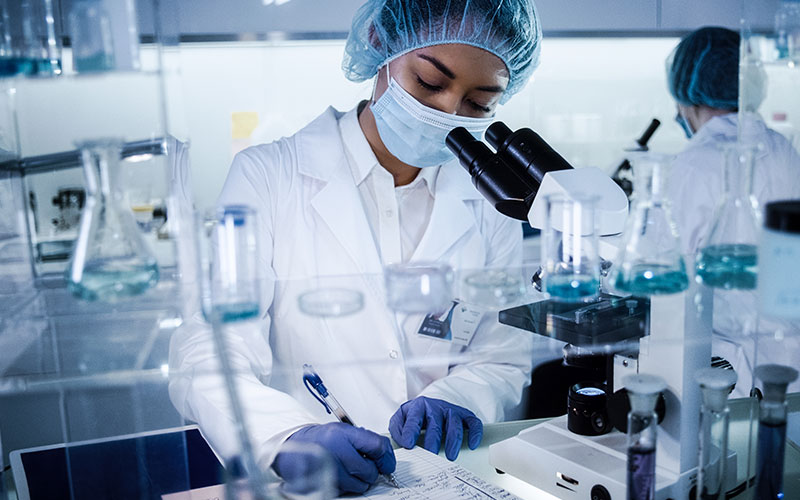- Home
- Growth Hormone
- Growth Hormone
- Growth Hormone Deficiency
- Growth Hormone Therapy
- Growth Hormone Injections
get startedThe Most Effective Hormone Replacement TherapiesHGH Therapy Benefits for Enhanced Weight Loss

While not prescribed as a “weight loss” product, there is clinical evidence that human growth hormone (HGH) can help you build lean muscle and lose weight.
Men and women who have low levels of HGH tend to be overweight. Growth hormone therapy can help you to lose weight and lower your risk of obesity.
HGH is made and secreted by the pituitary gland. As the pituitary releases HGH, it helps convert the protein and fats in the foods you eat into energy for your cells. The conversion of fat into energy during this process is known as lipolysis or simply the burning of fat. HGH is an essential hormone for lipolysis.
People that have a growth hormone deficiency are far more likely to be obese because the less HGH you have available, the worse your body is at breaking down fat. So, instead of being converted into energy, it is stored as fat. In fact, one of the tell-tale signs of a growth hormone deficiency is being overweight, particularly having an excess amount of belly fat.
In addition to obesity, fat mass around your middle has been associated with an increased risk of cardiovascular disease, metabolic syndrome, and type 2 diabetes. However, studies have found that HGH injections can help you to lose weight, manage obesity, and lower these risks.
How Can HGH Help You to Lose Weight?
HGH is not prescribed as a specific weight loss solution, but HGH therapy can help you to lose weight.
HGH can be effective for weight loss because of its impact on fat metabolism and the ability to build lean muscle. HGH is instrumental in your body’s ability to burn fat and more lean muscle even while at rest, further increases your metabolism and your ability to convert stored fat into energy.
The main way that HGH can help you to shed unwanted pounds, particularly around the middle, is that it improves lipolysis, which is your body’s ability to break down, stored triglycerides into free fatty acids — or more simply to "burn fat."
In addition to enhancing your body’s ability to break down fats, HGH also helps you to take off weight by stimulating the release of more Insulin-like growth-factor-1 (IGF-1). People who are obese tend to suffer from “insulin resistance.” When you have insulin resistance, insulin does not perform as efficiently, and therefore more sugars remain in your bloodstream, and more fat gets stored instead of converted to energy. IGF-1 stimulates fights insulin resistance by helping to move more glucose out of your bloodstream and into your cells. This will give you more energy, reduces your risk of diabetes, and help you to lose weight.
A recent study found that because of these mechanisms of action, HGH injections can prevent obesity. Prader-Willi syndrome (PWS) is a genetic disorder that is characterized by poor muscle tone, failure to achieve growth milestones, and delayed development. Children with PWS also tend to be rather obese.
HGH injections are used to treat the stunted growth of children with PWS. This study found that in these children, HGH injections also helped to manage obesity. The study was published in the Endocrine Journal. The Japanese researchers followed several PWS patients that began HGH replacement therapy at around five years of age and were taken off of growth hormone therapy at around 18 years of age. The researchers found that after a period of about six months after stopping growth hormone injections, the patient’s body mass index (BMI) increased by as much as nearly 40%.
The largest increases in fat were seen in the abdomen and internal organs, known as visceral adipose tissue, or VAT. "VAT accumulation is known to be more harmful and contribute more to obesity than fat that accumulates beneath the skin, or subcutaneous adipose tissue, or SAT," said the researchers.
The researchers also found that cessation of growth hormone therapy led to an increase in LDL (bad) cholesterol. High LDL cholesterol is a precursor to diabetes and obesity. Overall, the team concluded, “discontinuation of HGH therapy caused rapid increases in visceral adipose tissue and LDL cholesterol levels.”
The results of the research indicate that the continuation of growth hormone therapy could be beneficial in maintaining healthy body composition in children with GHD once they reach adulthood.
There is a definite link between your HGH levels and your body mass or weight.
HGH to Lose Weight Protocols
Currently, HGH is not being prescribed to patients specifically as a weight loss protocol. But if you are overweight and are exhibiting other symptoms of growth hormone deficiency and are prescribed growth hormone injections, you will lose weight and gain muscle mass.
The benefits of HGH for weight loss and reducing the risk of obesity and related syndromes have been well documented in various research studies. One of the earliest studies on the benefits of HGH – the landmark “Rudman Study” — found that the HGH can result in up to a 14% reduction of body fat with no additional exercising or dieting.
Using a typical double-blind protocol, the study included men over 60 receiving three HGH injections per week. The study found that there was a decrease of 14% in body fat and an increase of 8.8% muscle mass with no extra exercise, and there was also a slight increase in bone density.
Since then, many other studies have concluded that HGH is effective in reducing fat mass, especially visceral fat. A recent study on the effect of HGH therapy on weight loss found that for those in the study, "the range of loss in the first four weeks was between 9-17% of total body fat." That is significant weight loss within a noticeably short period of time of taking HGH injections.
While these studies indicate that HGH injections can be effective in improving fat metabolism even without any additional exercise or lifestyle changes, we know that for the best and quickest results, diet and exercise in combination with HGH therapy result in optimal weight loss and obesity management.
Can HGH Reduce Abdominal Fat?
HGH has been found to be particularly effective in the reduction of belly fat. While the study mentioned above was not conducted on overweight patients who did not have PWS, it clearly indicates how HGH can and does reduce abdominal visceral fat. The results of this study lend credence to the use of growth hormone therapy as a potential treatment for obesity, diabetes, metabolic syndrome, and/or any hormonal imbalance that leads to weight gain and muscle loss.
While growth hormone therapy is not currently approved by the FDA as a weight loss protocol, it is prescribed for patients with HIV to counteract the muscle loss typical of the disease. Furthermore, adults receiving growth hormone therapy to treat age-related growth hormone decline have reported increased muscle mass, fat loss, and an overall improvement in body composition and energy.
For age-related growth hormone deficiency, HGH therapy is usually prescribed for six months. Over the course of that six-month period, you will see the many benefits of HGH, including significant weight loss. You will start to see weight loss within the first month of starting HGH therapy. A recent study on the effect of HGH therapy on weight loss found that for those in the study, "the range of loss in the first four weeks was between 9-17% of total body fat." That is significant weight loss within a noticeably short period of time of taking HGH injections.
Many patients with growth hormone deficiency are obese or overweight.
Can HGH Be Used to Manage Obesity?
Doctors and medical researchers know that obese individuals also almost always suffer from some degree of growth hormone deficiency.
HGH can help reduce the risk of obesity through its actions on two enzymes which are essential to lipolysis as well as and lipogenesis (storage and accumulation of fat). These enzymes are lipoprotein lipase (LPL) and hormone-sensitive lipase (HSL).
Through its action on these two hormones, HGH reduces the uptake of free fatty acids by adipocytes (fat storage cells). HGH also stimulates the body to use free fatty acids (FFAs) and remove them from the bloodstream and convert glucose into energy through its effect on IGF-1.
What Does the Medical Research Say About HGH and Weight Loss?
The ability of HGH to raise metabolism and increase your ability to burn fat has been well documented.
As early as 1999, a study was published that found HGH produces "accelerated lipolysis," or enhanced fat burning. That study, published in the medical journal Hormone Research looked at 24 obese individuals. Using typical double-blind protocol, all the patients were put on a calorie-restrictive diet, and half were treated with HGH, half were given a placebo.
The researchers found that “HGH treatment caused a 1.6-fold increase in the fraction of body weight lost as fat and a greater loss of visceral fat area than placebo treatment.” The researchers concluded, “This study demonstrates that in obese subjects given a hypocaloric diet, HGH accelerates body fat loss, exerts anabolic effects, and improves HGH secretion. These findings suggest a possible therapeutic role of low-dose GH with caloric restriction for obesity.”
A study entitled obesity, growth hormone, and weight loss found that growth hormone could indeed reduce abdominal fat and was effective particularly for patients who were considered obese or significantly overweight, concluding that, “HGH seems to reduce total and abdominal fat mass in obese subjects.”
Another found that HGH specifically reduced obesity in postmenopausal women, this one concluding that “one year of GH treatment in postmenopausal women with abdominal obesity reduced the amount of visceral fat, increased thigh muscle area, improved the serum lipid pattern compared with placebo treatment, and improved insulin sensitivity within the GH treatment group.
A research paper published in the journal Hormone Research in Pediatrics on HGH and weight loss in adults confirmed that "HGH had [fat burning] properties that resulted in reduction and redistribution of body fat."
Another clinical trial looking at HGH and weight loss definitively concluded that “HGH [therapy] accelerates body fat loss, exerts anabolic effects and improves HGH secretion. These findings suggest a possible therapeutic role of low-dose HGH with caloric restriction for obesity.”
Research indicates that growth hormone injections can enhance your ability to lose weight and lower your risk of obesity.
Now that you know more about the connections between HGH therapy, obesity, and weight loss, why not take a minute to contact us and learn more about the many other life-changing benefits of growth hormone therapy.
- Growth Hormone Therapy



























